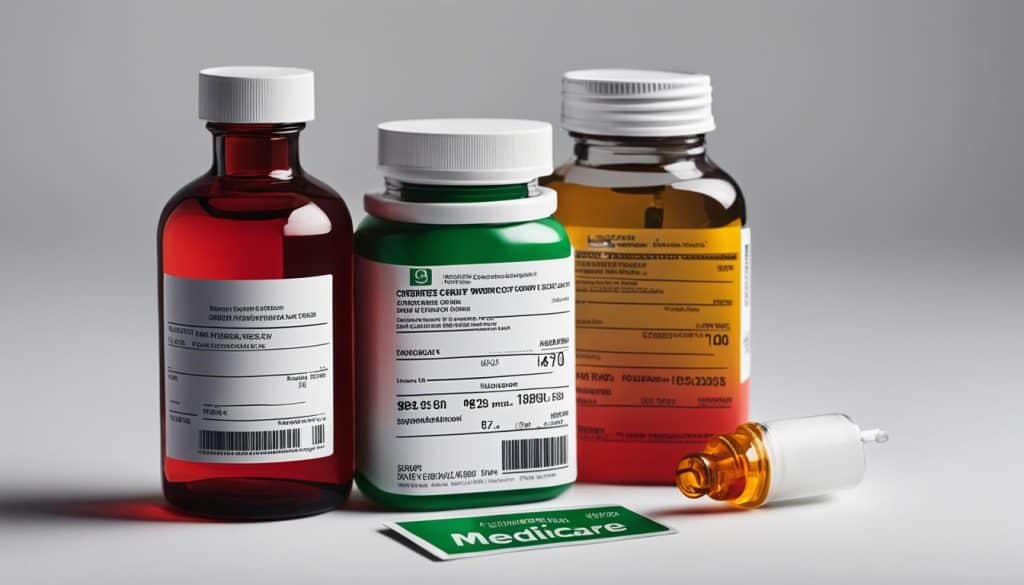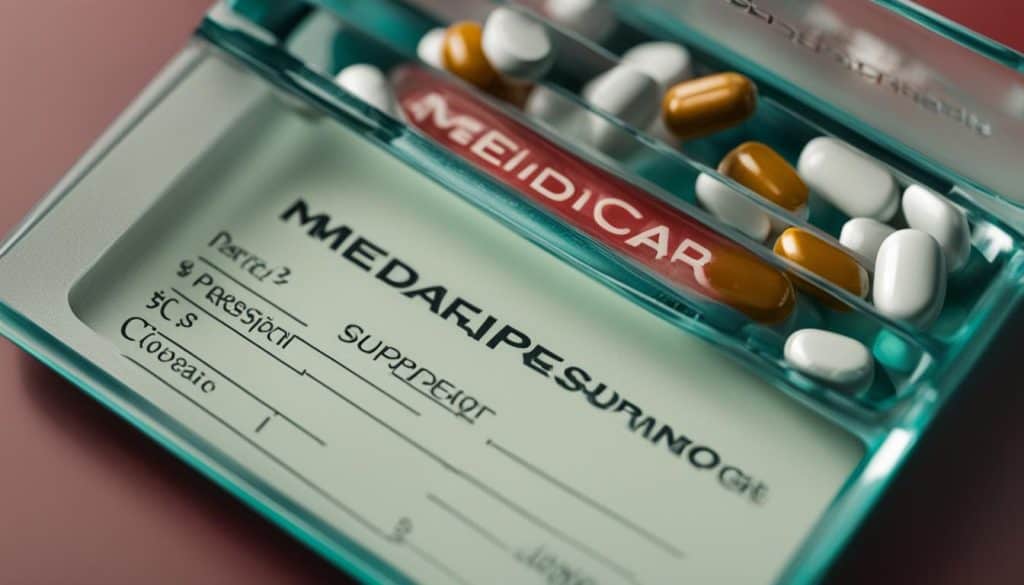If you’re considering a Medicare Supplement plan, also known as Medigap, you may be wondering if prescription drug coverage is included. Prescription drugs can be a significant expense for many seniors, so it’s essential to understand what benefits your Medigap policy provides. In this section, we will explore whether Medicare Supplement Plans cover prescription drugs and what options may be available to help with these costs.
Key Takeaways:
- Medicare Supplement plans do not provide direct coverage for prescription drugs.
- Medicare Part D is a separate prescription drug plan offered by private insurance companies approved by Medicare.
- Some Medicare Supplement Plans may offer additional benefits related to prescription medications.
- Medicare SELECT plans may offer prescription drug benefits along with other additional coverage.
- It’s important to carefully evaluate your options and consider your individual needs when selecting a Medicare Supplement Plan and prescription drug coverage.
Understanding Medicare Supplement Plans
Before we explore prescription drug coverage under Medicare Supplement Plans, let’s first understand what these plans are.
Medicare Supplement Plans, also known as Medigap plans, are private insurance policies designed to fill the gaps in Original Medicare coverage. These plans cover the costs that Original Medicare doesn’t pay for, such as deductibles, copayments, and coinsurance.
Medicare Supplement Plans are sold by private insurance companies, such as Integrity Now Insurance Brokers, and are standardized across most states, with ten different plan types available. Each plan type is identified by a letter, from Plan A to Plan N.
While Medicare Supplement Plans can provide additional coverage and financial protection, they do not include prescription drug coverage.
Now that we have a basic understanding of Medicare Supplement Plans, let’s explore the different aspects of prescription drug coverage and how it relates to these plans.

Did you know? Medicare Supplement Plans are standardized, meaning that the benefits for each plan type are the same, regardless of the insurance company offering the plan.
Medicare Part D Prescription Drug Coverage
To understand prescription drug coverage under Medicare Supplement Plans, it’s essential to know about Medicare Part D. Medicare Part D is a standalone prescription drug plan that provides coverage for prescription medications. It is typically offered through private insurance companies approved by Medicare.
Medicare Part D coverage varies depending on the specific plan, but most plans have a formulary, or list of covered medications. Each medication on the formulary is assigned to a specific coverage tier, and the cost for each medication can vary between tiers.
In addition to the formulary, Medicare Part D plans also have a list of pharmacies where you can fill your prescriptions. If you go to a pharmacy outside of the plan’s network, you may have to pay more for your medications.
It’s important to note that Medicare Part D is separate from Medicare Supplement Plans, and it is necessary to enroll in a Part D plan to receive prescription drug coverage. There are penalties for enrolling late in a Part D plan, so it’s crucial to enroll during your initial enrollment period or during the annual open enrollment period.

You might be thinking, “If Medicare Part D provides prescription drug coverage, why do I need a Medicare Supplement Plan?” The answer is that Medicare Part D alone may not be enough to cover all of your healthcare expenses. In addition, some medications may not be covered by Part D plans, or may only be covered at a high cost. This is where a Medicare Supplement Plan can come in handy.
Integrity Now Insurance Brokers
If you’re looking for guidance on Medicare Supplement Plans and prescription drug coverage, consider reaching out to Integrity Now Insurance Brokers. They are a Medigap insurance agency with years of experience helping clients navigate the complex world of Medicare. Their knowledgeable staff can answer your questions and help you find the right coverage for your needs.
Medicare Supplement Plans and Prescription Drugs
Although Medicare Supplement Plans do not directly provide coverage for prescription drugs, some plans may offer additional benefits related to prescription medications. These benefits can vary depending on the insurance company and the specific Medicare Supplement plan. Some of the ways that Medicare Supplement Plans can provide coverage for prescription drugs include:
- Discounts on Prescription Medications: Some Medicare Supplement Plans offer discounts on prescription medications that can help you save money on your prescription drug costs. These discounts may be available for certain medications or for all prescription drugs, depending on the plan.
- Coverage for Prescription Drug Costs During the Part D Coverage Gap: If you have a Medicare Supplement Plan that includes this benefit, you may be able to receive coverage for your prescription drug costs during the Part D coverage gap, also known as the “donut hole.” This coverage can help you save money on your prescription medications when you reach the Part D coverage gap.
- Coverage for Prescription Medications Not Covered by Part D: Some Medicare Supplement Plans may offer coverage for prescription medications that are not covered by Part D. This can include certain types of medications, such as vitamins and supplements, that are not covered by Medicare.
If you have questions about the prescription drug benefits offered by your Medicare Supplement Plan, or if you’re considering enrolling in a Medicare Supplement Plan and want to know more about your prescription drug coverage options, speak with an authorized agent at Integrity Now Insurance Brokers. They can help you understand the benefits and costs associated with your Medicare Supplement Plan, as well as the different options available for prescription drug coverage.
Example:
“I have a Medicare Supplement Plan, but I’m not sure if it covers my prescription medications. Can you help me understand my options?”

Medicare Supplement Plans with Prescription Drug Coverage
While Medicare Supplement Plans themselves do not include coverage for prescription drugs, some Medigap plans may offer prescription drug benefits as an additional option. These plans are known as Medicare SELECT plans and are designed to work alongside a separate Medicare Part D prescription drug plan. The availability of Medicare SELECT plans depends on the state where you reside and the insurance company that provides the plan.
If you are eligible for a Medicare SELECT plan, it can offer several benefits. First, you can have greater flexibility in choosing the type of prescription drug coverage that best suits your needs. For example, you can select a plan that offers a wider range of prescription medications or one that provides more comprehensive coverage for the prescription drugs you currently take. Additionally, some Medicare SELECT plans may offer lower premiums for prescription drug coverage or may include other benefits related to prescription drugs, such as coverage for select over-the-counter medications.
It’s important to note that while Medicare SELECT plans may offer prescription drug coverage, they do not provide comprehensive coverage on their own. As such, it is necessary to enroll in a separate Medicare Part D prescription drug plan to receive full prescription drug coverage.
| Pros of Medicare Supplement Plans with Prescription Drug Coverage | Cons of Medicare Supplement Plans with Prescription Drug Coverage |
|---|---|
|
|
Integrity Now Insurance Brokers, a Medigap insurance agency, can assist you in evaluating your options for Medicare Supplement Plans with prescription drug coverage. By carefully assessing your healthcare needs and preferences, we can help you find a plan that provides comprehensive coverage while also accommodating your budget and lifestyle. Contact us today to learn more about your options for Medicare Supplement Plans with prescription drug coverage.

Comparing Medicare Supplement and Part D Prescription Drug Coverage
Both Medicare Supplement Plans and Medicare Part D prescription drug coverage provide essential healthcare benefits for seniors. However, determining which option is best for your individual needs can be challenging. In this section, we will compare the advantages and disadvantages of each option to help you make an informed decision.
Medicare Supplement Plans
Medicare Supplement Plans, or Medigap plans, are designed to help cover the gaps in Original Medicare coverage. These plans are sold by private insurance companies, with each plan offering a different level of coverage. Medicare Supplement Plans do not provide prescription drug coverage on their own, but some plans may offer additional benefits related to prescription medications.
The advantages of Medicare Supplement Plans include:
- Flexibility to choose your doctor and hospital
- No network restrictions
- Standardized benefits and coverage across all plans of the same type
The disadvantages of Medicare Supplement Plans include:
- No coverage for prescription drugs, except for select Medigap plans
- Higher premiums compared to other options
Medicare Part D Prescription Drug Coverage
Medicare Part D is a standalone prescription drug plan that provides coverage for prescription medications. It is typically offered through private insurance companies approved by Medicare. Medicare Part D is separate from Medicare Supplement Plans, and it is necessary to enroll in a Part D plan to receive prescription drug coverage.
The advantages of Part D prescription drug coverage include:
- Lower out-of-pocket costs for prescription medications
- Large network of pharmacies to choose from
- Multiple plan options to fit individual needs and budget
The disadvantages of Part D prescription drug coverage include:
- Restricted network of pharmacies for some plans
- Formularies that may not cover certain medications
- Potentially high premiums and deductibles
Integrity Now Insurance Brokers, a Medigap insurance agency, can help you compare and select the right Medicare Supplement Plan or Part D prescription drug plan for your individual needs. By understanding the advantages and disadvantages of each option, you can make an informed decision and ensure you have comprehensive coverage for your healthcare needs.

Exploring Additional Prescription Drug Options
In addition to Medicare Supplement Plans and Part D prescription drug coverage, there are other options available to help cover the costs of prescription medications. Some of these options include:
- Prescription Assistance Programs (PAPs) – These programs provide free or low-cost medications to individuals who meet specific eligibility criteria. Many pharmaceutical companies offer PAPs for their brand-name medications, and there are also non-profit organizations and government programs that provide PAPs for generic and brand-name drugs. To find PAPs that may be available to you, visit Needymeds.org.
- State Pharmaceutical Assistance Programs (SPAPs) – These programs, offered by some states, provide assistance with prescription drug costs to low-income individuals and seniors. Eligibility requirements vary by state, and benefits may include reduced copays, coverage for medications not covered by Medicare, and more. To find out if your state offers an SPAP, visit the Medicare website.
- Discount Prescription Drug Cards – These cards offer discounts on prescription medications at participating pharmacies. They are available to anyone, regardless of income or insurance status, and can be a great option for those who are underinsured or have high medication costs. Some popular discount prescription drug cards include GoodRx, Blink Health, and ScriptSave WellRx.
It’s important to note that these options may have specific eligibility requirements and limitations, so it’s essential to research and understand the details before enrolling in any programs. Additionally, it may be beneficial to consult with an insurance agent or broker, such as Integrity Now Insurance Brokers, a Medigap insurance agency, to ensure you have comprehensive coverage for your prescription drug needs.
By exploring these additional prescription drug options, you can alleviate the financial burden of medication costs and ensure you have access to the medications you need to maintain your health.

Conclusion
Integrity Now Insurance Brokers, a Medigap insurance agency, hopes this article has provided you with a comprehensive understanding of prescription drug coverage under Medicare Supplement Plans. While Medicare Supplement Plans do not directly cover prescription drugs, there are ways to obtain coverage by enrolling in a separate Medicare Part D plan or selecting a Medicare SELECT Plan that offers prescription drug benefits.
When selecting a Medicare Supplement Plan and prescription drug coverage, it’s essential to consider your individual needs and budget carefully. Comparing the advantages and disadvantages of each option will help you make an informed decision and ensure comprehensive coverage for your healthcare needs.
It’s also important to note that there may be additional programs and resources available to assist with prescription drug expenses, such as prescription assistance programs and state pharmaceutical assistance programs. Exploring these options can help ensure you have complete coverage for your prescription drug needs.
In summary, while Medicare Supplement Plans themselves do not cover prescription drugs, the combination of a Medicare Supplement Plan and a separate Part D plan or Medicare SELECT plan can provide comprehensive coverage. By understanding your options and needs, you can select a plan that best suits your healthcare needs and budget.
Thank you for choosing Integrity Now Insurance Brokers for your Medicare Supplement Insurance needs.
FAQ
Do Medicare Supplement Plans Cover Prescription Drugs?
No, Medicare Supplement Plans do not directly provide coverage for prescription drugs. However, there are ways to obtain prescription drug coverage in conjunction with a Medicare Supplement Plan through Medicare Part D and select Medicare Supplement Plans.
What are Medicare Supplement Plans?
Medicare Supplement Plans, also known as Medigap plans, are private insurance policies designed to fill the gaps in Original Medicare coverage. They are sold by private insurance companies and can help cover some of the healthcare costs that Original Medicare doesn’t pay for.
What is Medicare Part D Prescription Drug Coverage?
Medicare Part D is a standalone prescription drug plan that provides coverage for prescription medications. It is offered through private insurance companies approved by Medicare. To receive prescription drug coverage, it is necessary to enroll in a Part D plan in addition to a Medicare Supplement Plan.
Do Medicare Supplement Plans offer any coverage for prescription drugs?
While Medicare Supplement Plans do not directly provide coverage for prescription drugs, some plans may offer additional benefits related to prescription medications. These benefits can vary depending on the insurance company and the specific Medicare Supplement plan.
Are there any Medicare Supplement Plans that include prescription drug coverage?
While most Medicare Supplement Plans do not include prescription drug coverage, some plans known as Medicare SELECT plans may offer prescription drug benefits along with other additional coverage. These plans are designed to work alongside a separate Part D prescription drug plan.
What is the difference between Medicare Supplement Plans and Part D prescription drug coverage?
Medicare Supplement Plans and Part D prescription drug coverage are separate options for obtaining coverage for prescription drugs. Medicare Supplement Plans focus on filling the gaps in Original Medicare coverage, while Part D plans specifically provide coverage for prescription medications. Both options have advantages and disadvantages, and it’s important to evaluate your individual needs to determine which option is best for you.
Are there any additional prescription drug options available?
In addition to Medicare Supplement Plans and Part D prescription drug coverage, there may be other options available to help cover the costs of prescription medications. These include prescription assistance programs and state pharmaceutical assistance programs. Exploring these additional options can ensure comprehensive coverage for your prescription drug needs.










